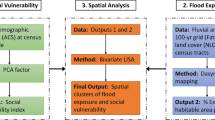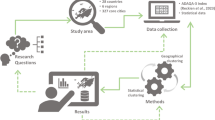Abstract
Most scientific assessments for climate change adaptation and risk reduction are based on scenarios for climatic change. Scenarios for socio-economic development, particularly in terms of vulnerability and adaptive capacity, are largely lacking. This paper focuses on the utility of socio-economic scenarios for vulnerability, risk and adaptation research. The paper introduces the goals and functions of scenarios in general and reflects on the current global debate around shared socio-economic pathways (SSPs). It examines the options and constraints of scenario methods for risk and vulnerability assessments in the context of climate change and natural hazards. Two case studies are used to contrast the opportunities and current constraints in scenario methods at different scales: the global WorldRiskIndex, based on quantitative data and indicators; and a local participatory scenario development process in Jakarta, showing a qualitative approach. The juxtaposition of a quantitative approach with global data and a qualitative-participatory local approach provides new insights on how different methods and scenario techniques can be applied in vulnerability and risk research.





Similar content being viewed by others
Notes
All of the scenario data used is based on the data within the Base Case, Security First and Sustainability First scenarios version 6.68 of IFs. Several of the variables used in this analysis will be available as part of the SSP process. For instance, population, GDP and urbanisation projections on the country level are currently available while other indicators will be produced as output of integrated assessment models (including the IFs) and other approaches. The IFs dataset is currently the most consistently available projection for these indicators.
References
Birkmann J, von Teichman K (2010) Integrating disaster risk reduction and climate change adaptation: key challenges – scales, knowledge, and norms. Sustain Sci 5(2):171–184
Birkmann J, Welle T, Krause D, Wolfertz J, Suarez DC, Setiadi N (2011) WorldRiskIndex: Concept and results. In: Alliance Development Works (eds) WorldRiskReport. Berlin, pp. 13–42
Dickson JR, Hughes BB, Irfan MT (2010) Advancing Global Education. Volume 2, Patterns of Potential Human Progress series. Paradigm Publishers and Oxford University Press, Boulder, New Delhi
Giannini V, Ceccato L, Hutton C, Allan AA, Kienberger S, Flügel W-A, Giupponi C (2011) Development of responses based on IPCC and “what-if?” IWRM scenarios. Adv Sci Res 7(71):71–81
Glenn JC and The Futures Group International (2009) Scenarios—chapter 19. In Glenn JC, Gordon TJ (eds). The millenium project—Futures research methodology, Version 3.0. Washington, DC. available also at: http://www.millennium-project.org/millennium/FRM-V3.html. Accessed 29 January 2013
Gordon TJ (2009) Interactive scenarios. In: Glenn JC, Gordon TJ (eds). The millenium project—Futures research methodology, Version 3.0. Washington, DC. available at: http://www.millennium-project.org/millennium/FRM-V3.html. Accessed 29 January 2013
Hallegatte S, Przyluski V, Vogt-Schilb A (2011) Building world narratives for climate change impact, adaptation and vulnerability analyses. Nat Clim Chang 1:151–155
Hughes BB, Irfan M, Khan H, Kumar K, Rothman DS, Solórzano JR (2009) Reducing Global Poverty. Vol. 1 of the Patterns of Potential Human Progress series. Paradigm Publishers and Oxford University Press, Boulder, New Delhi
Hughes BB, Kuhn R, Peterson C, Rothman DS, Solórzano JR (2011) Improving global health. Vol. 3 of the Patterns of Potential Human Progress Series. Paradigm Publishers and Oxford University Press, Boulder, New Delhi
Hughes BB, Joshi DK, Moyer JD, Sisk TD, Solórzano JR (2013) Strengthening governance globally. Vol. 5 of the Patterns of Potential Human Progress Series. Paradigm Publishers and Oxford University Press, Boulder, New Delhi
IPCC (Intergovernmental Panel on Climate Change) (1994) IPCC Technical Guidelines for Assessing Climate Change Impacts and Adaptation. In: Carter TR, Parry ML, Harasaea H, Nishioka S (eds) Part of the IPCC Special Report to the first Session of the Conference of the Parties to the UN Framework Convention on Climate Change. University College London (United Kingdom) and Center for Global Research (Japan), London and Ibaraki, p 72
IPCC (Intergovernmental Panel on Climate Change) (2012) Managing the Risks of Extreme Events and Disasters to Advance Climate Change Adaptation. In: Field CB, Barros V, Stocker TF, Qin D, Dokken DJ, Ebi KL, Mastrandrea MD, Mach KJ, Plattner G-K, Allen SK, Tignor M, Midgley PM (eds) A Special Report of Working Groups I and II of the Intergovernmental Panel on Climate Change. Cambridge University Press, Cambridge, UK, and New York, NY, USA, p 582
Jones R, Preston B (2011) Adaptation and risk management, WIRs. Climatic Change 2(2):296–308
Khakee A (1999) Participatory scenarios for sustainable development. Foresight 1(3):229–240
Kok K, van Vliet M, Bärlund I, Dubel A, Sendzimir J (2011) Combining participative backcasting and exploratory scenario development: experiences from the SCENES project. Technol Forecast Soc Chang 78:835–851
Kriegler E, O’Neill BC, Hallegatte S, Kram T, Lempert RJ, Moss RH, Wilbanks T (2012) The need for and use of socio-economic scenarios for climate change analysis: a new approach based on shared socio-economic pathways. Glob Environ Chang 22:807–822
Mathers CD, Loncar D (2006) Projections of global mortality and burden of disease from 2002 to 2030. PloSMed 3(11):2011–2030
Moss RH, Edmonds JA, Hibbard KA, Manning MR, Rose SK, van Vuuren DP, Carter TR, Emori S, Kainuma M, Kram T, Meehl GA, Mitchell JFB, Nakicenovic N, Riahi K, Smith SJ, Stouffer RJ, Thomson AM, Weyant JP, Wilbanks TJ (2010) The next generation of scenarios for climate change research and assessment. Nature 463:747–756
O’Neill BC, Kriegler E, Riahi K, Ebi KL, Hallegatte S, Mathur R, Carter, T.R., van Vuuren, D.P (2013) A new scenario framework for climate change research: the concept of shared socioeconomic pathways. Climatic Change. doi:10.1007/s10584-013-0905-2
Peduzzi P, Chatenoux B, Dao H, de Bono A, Herold C, Kossin J, Mouton F, Nordbeck O (2012) Global trends in tropical cyclone risk. Nat Clim Chang 2(4):289–294
Preston BL, Brooke C, Smith T, Measham T, Gorddard R (2009) Igniting change in local government: lessons learned from a bushfire vulnerability assessment. Mitig Adapt Strateg Glob Chang 14(3):281–283
Rothman DS, Irfan MT, Margolese-Malin ES, Hughes BB, Moyer JD (2013) Building Global Infrastructure vol. 4 of the Patterns of Potential Human Progress Series. Paradigm Publishers and Oxford University Press, Boulder, New Delhi
Schipper L (2009) Meeting at the crossroads? Exploring the linkages between climate change adaptation and disaster risk reduction. Clim Dev 1(1):16–30
Scholz RW, Tietje O (2002) Embedded case study methods: Integrating quantitative and qualitative knowledge. Sage, Thousand Oaks
Tol R, Yohe G (2007) The weakest link hypothesis for adaptive capacity: an empirical test. Glob Environ Chang 17:218–227
Tol R, Ebi K, Yohe G (2007) Infectious disease, development, and climate change: a scenario analysis. Environ Dev Econ 12:687–706
United Nations/ISDR (United Nations International Strategy for Disaster Reduction) (2004) Living with risk. A global review of disaster reduction initiatives. United Nations, Geneva
UNEP (United Nations Environment Programme) (2007) Global environment outlook—GEO 4. Environment for development, Nairobi
Van Aalst M, Cannon T, Burton I (2008) Community level adaptation to climate change: the potential role of participatory community risk assessment. Glob Environ Chang 18(1):165–179
van Ruijven BJ, Levy M, Agrawal A, Biermann F, Birkmann J, Carter TR, Ebi KL, Garschagen M, Jones B, Jones R, Kemp-Benedict E, Kok M, Kok K, Lemos MC, Lucas PL, Orlove B, Pachauri S, Parris T, Patwardhan A, Petersen A, Preston BL, Ribot J, Rothman DS, Schweizer VJ (2013) Enhancing the relevance of global shared socio-economic pathways for climate change impacts, vulnerability and adaptation research. Climatic Change. doi:10.1007/s10584-013-0931-0
van Vuuren DP, Batlle Bayer L, Chuwah C, Ganzeveld L, Hazeleger W, van den Hurk B, van Noije T, O’Neill B, Strengers BJ (2012a) A comprehensive view on climate change: coupling of earth system and integrated assessment models. Environmental Research Letters, 7. doi:10.1088/1748-9326/7/2/024012.
van Vuuren DP, Riahi K, Moss R, Edmonds J, Thomson A, Nakicenovic N, Kram T, Berkhout F, Swart R, Janetos A, Rose SK, Arnell N (2012b) A proposal for a new scenario framework to support research and assessment in different climate research communities. Glob Environ Chang 22:21–35
van Vuuren DP, Kriegler E, O’Neill B, Ebi KL, Riahi K, Carter TR, Edmonds J, Hallegatte S, Kram T, Matur R, Winkler H (2013) A new scenario framework for Climate Change Research: Scenario matrix architecture. Climatic Change. doi:10.1007/s10584-013-0906-1
Welle T, Birkmann J, Rhyner J, Witting M, Wolfertz J (2012) WorldRiskIndex 2012: concept and results. In Alliance Development Works (eds.): WorldRiskReport. Berlin, pp. 11–26
Wiek A, Binder CR, Scholz RW (2006) Functions of scenarios in transition processes. Futures 38(7):740–766
World Bank (2013) Global economic and social data of the World Bank; available under: http://data.worldbank.org/indicator/NY.GNP.PCAP.CD
Author information
Authors and Affiliations
Corresponding author
Additional information
This article is part of a Special Issue on “Advancing Climate Change Adaptation and Risk Management” edited by Joern Birkmann and Reinhard Mechler.
Electronic supplementary material
Below is the link to the electronic supplementary material.
ESM 1
(DOCX 2.26 MB)
Rights and permissions
About this article
Cite this article
Birkmann, J., Cutter, S.L., Rothman, D.S. et al. Scenarios for vulnerability: opportunities and constraints in the context of climate change and disaster risk. Climatic Change 133, 53–68 (2015). https://doi.org/10.1007/s10584-013-0913-2
Received:
Accepted:
Published:
Issue Date:
DOI: https://doi.org/10.1007/s10584-013-0913-2




